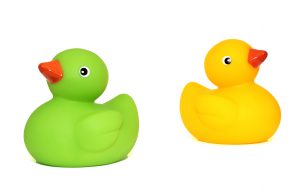I’ve recently been working my way through the You Don’t Know JS books by Kyle Simpson. If you are learning JavaScript and haven’t taken a look at these books, uhhh, what are you waiting for??
“JavaScript sucks man….”
There are a lot of arguments out there as to why JavaScript is such a shitty programming language. Accompanying each of these arguments are books and blogs by authors that try to teach JavaScript in spite of it’s shittiness!!
“Uhhh, no, you just don’t get it…”
Kyle Simpson takes the opposite approach… As you can see in the Preface of his YDKJS series, his opinion is that JavaScript is a deep and rich language that few developers take the time to know properly. His argument is that when faced with an obstacle, many JS developers blame the language rather than their lack of understanding.
Now that sounds like someone I want to learn from! Taking this approach establishes a level of accountability and responsibility to one’s craft.
So when other authors are saying ‘JS is a shitty language, here’s how to get around it’s shittiness’, Kyle Simpson is saying ‘JS is a deep and powerful language, here’s how to embrace it and have it work for you.’
I’ve read three of the six YDKJS books completely and skimmed through the other three. There are some really difficult concepts covered that take a couple times reading through to fully grasp. Concepts like closures, modules, ‘this’, prototypes and async to name a few..
What’s the point of this post??
I plan on writing a series of blog posts that work through these concepts and explain them at a basic level. Do I think I can explain these better than the author? Absolutely not, so I encourage you to read the books (in addition to my blog, of course).
I am, however, doing this for two reasons.
First, obviously I’m far closer to a beginner than Kyle Simpson, which, believe it or not, can have it’s advantages when trying to explain complex concepts. It’s possible that I can word these concepts in a way that might be more relatable to someone just starting out. (I’m not saying it’s going to happen, just that it’s possible)
Second, it’s an exercise in rubber ducking.

And what the hell is Rubber Ducking??
If you haven’t heard the term, rubber ducking is a technique by which you try to understand something by explaining it to a rubber duck.
The theory is, in order to teach it to someone who has no previous understanding (i.e. the duck), you must completely understand the concept yourself! (if you haven’t noticed, I do a lot of rubber ducking here at Crooked Code)
So rather than just read through these books for a second time, I’m going to work through them and try to teach these concepts so they might be understood by a beginner.
Even if nobody reads or visits these posts, I will have gained a better grasp of the difficult parts of JavaScript by teaching them…
More rubber ducking posts to come, I hope you enjoy and get something out of them. That’s it for now…
-Jeremy